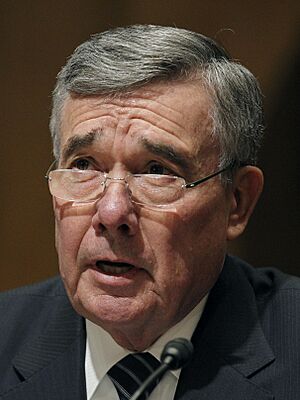Gil Kerlikowske facts for kids
Quick facts for kids
Gil Kerlikowske
|
|
|---|---|
 |
|
| Commissioner of U.S. Customs and Border Protection | |
| In office March 7, 2014 – January 20, 2017 |
|
| President | Barack Obama |
| Preceded by | Thomas S. Winkowski (Acting) |
| Succeeded by | Kevin McAleenan |
| Director of the Office of National Drug Control Policy | |
| In office May 7, 2009 – March 7, 2014 |
|
| President | Barack Obama |
| Preceded by | Ed Jurith (Acting) |
| Succeeded by | Michael Botticelli |
| Personal details | |
| Born | November 23, 1949 Fort Myers, Florida, U.S. |
| Political party | Democratic |
| Spouse | Anna Lazlo |
| Education | University of South Florida (BCJ, MCJ) |
| Military service | |
| Allegiance | |
| Branch/service | |
| Years of service | 1970–1972 |
Richard Gil Kerlikowske (born November 23, 1949) is a public servant who has led several important government agencies. He was the Commissioner of U.S. Customs and Border Protection from 2014 to 2017. Before that, he was the Director of the Office of National Drug Control Policy under President Barack Obama.
Kerlikowske has a long history in law enforcement. He was the Chief of Police in four different cities, including Seattle, Washington. After his government service, he became a professor, sharing his knowledge with students at Northeastern University.
Contents
Early Life and Education
Gil Kerlikowske grew up in Florida. He graduated from Fort Myers High School in 1968.
He earned two degrees in criminal justice from the University of South Florida. The university also gave him an honorary doctorate. He also trained at the FBI's Academy in Quantico, Virginia.
Career in Law Enforcement
Beginning His Career
In 1970, Kerlikowske was drafted into the United States Army. He served for two years as a military police officer in Washington, D.C. One of his duties was to salute President Richard Nixon.
After the army, he started his police career in 1972 in St. Petersburg, Florida. He worked his way up and became the Chief of Police in two other Florida cities, Fort Pierce and Port St. Lucie. He also served as the police commissioner for Buffalo, New York.
Later, he worked for the United States Justice Department. There, he helped manage programs that supported community policing across the country.
Seattle's Chief of Police
In 2001, Kerlikowske became the Chief of Police for the Seattle Police Department. He led the department for almost eight years. During his time as chief, he faced several challenges, including managing large public protests.
One of his goals was to make policing safer. In 2003, for the first time in 15 years, there were no shooting deaths involving Seattle police officers. Kerlikowske said this was partly because officers began using tools like Tasers, which are less deadly than guns.
..... Kerlikowske said that his department was already treating it as a low priority.
Working for the U.S. Government
Director of National Drug Control Policy
In 2009, President Barack Obama asked Kerlikowske to lead the Office of National Drug Control Policy. .....
Kerlikowske announced that the government would change its approach. Instead of just focusing on punishment, he wanted to put more effort into science-based treatment and prevention. He said that helping people get better was a key part of the plan.
He often spoke about the government's policies. He believed that education and health care were important tools. He also praised past efforts like the "Just Say No" campaign for raising awareness.
Commissioner of U.S. Customs and Border Protection
In 2014, Kerlikowske took on a new role as the Commissioner of U.S. Customs and Border Protection (CBP). The U.S. Senate confirmed him for the job.
The CBP is a very large agency responsible for protecting the country's borders. It manages the flow of people and goods at airports, seaports, and land borders. As commissioner, Kerlikowske was in charge of thousands of officers and agents who keep the country safe. He led the agency until 2017.
See also
- List of U.S. executive branch czars
 | John T. Biggers |
 | Thomas Blackshear |
 | Mark Bradford |
 | Beverly Buchanan |

